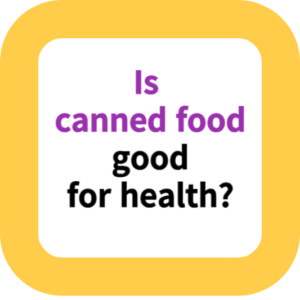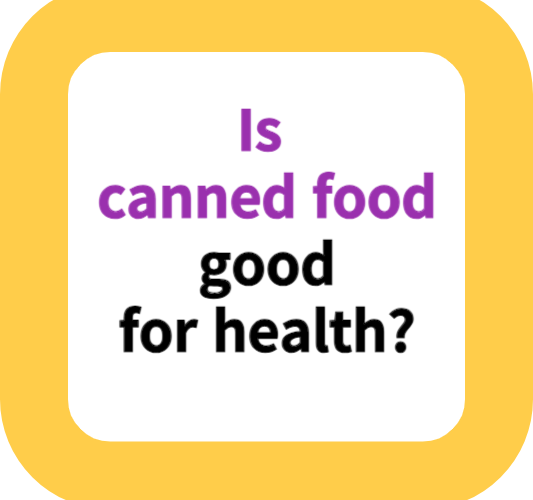Is canned food good for health?
Welcome to our latest blog post where we delve into the often overlooked world of canned foods. In this comprehensive discussion, we explore the intricate balance between nutrition, convenience, and shelf stability that canned foods offer.
While they may not always match the nutritional profile of their fresh or frozen counterparts, canned foods hold a unique place in our pantries, especially during times when access to fresh produce is limited.
We’ll discuss the benefits and drawbacks of canned vegetables, the impact of canning on nutrient retention, and how to make healthier choices within the canned goods aisle.
Our aim is to provide a new perspective on canned foods, highlighting their role in a balanced diet and offering practical tips for incorporating them into your meals without compromising on health.
Join us as we unravel the myths and truths about canned foods, and learn how to strike the perfect balance between convenience and nutrition.
Is canned food good for health?

Introduction: The Role of Canned Foods in a Balanced Diet
Canned foods often find themselves in the shadow of their fresh and frozen counterparts, overshadowed by concerns about their nutritional value and quality.
However, they play a crucial role in providing a stable food source that can be vital in circumstances where fresh or frozen options are scarce. This extended discussion aims to explore the benefits and drawbacks of canned foods, especially in terms of nutrition and health.
The Advantages of Canned Foods
Canned foods offer several significant benefits that make them a valuable addition to any pantry. One of their primary advantages is shelf stability; canned goods can be stored for extended periods without spoiling.
This makes them indispensable in situations where regular grocery shopping isn’t feasible. Furthermore, canned foods are not bound by seasonality, ensuring a constant supply of various food items year-round.
Convenience is another key factor, as canned foods usually require minimal preparation, being fully cooked and ready to eat or require little additional cooking.
Nutritional Comparison: Fresh, Frozen, and Canned
When considering nutrition, it’s important to recognize the differences between canned, fresh, and frozen foods. Fresh and frozen vegetables typically offer higher nutritional value compared to their canned counterparts.
The canning process, which involves high heat, often leads to overcooked vegetables that may lose some of their vitamins and minerals. Despite this, canned foods still provide a healthier option compared to many heavily processed foods, offering more nutrients per calorie. They are particularly useful for those who have limited access to fresh produce or struggle with food preparation.
Selecting the Best Canned Vegetables
The quality of canned vegetables varies widely, with some faring better than others in the canning process. For example, tomatoes are often more flavorful when canned, as they are harvested at peak ripeness for processing.
This contrasts with fresh supermarket tomatoes that are typically picked while still underripe. Similarly, winter squashes like pumpkin retain their quality well in cans. On the other hand, green vegetables such as peas, asparagus, and collards may lose texture and flavor in the canning process, although this can appeal to certain tastes.
Reevaluating Food as a Nutritional Source
It’s essential to move away from viewing food as magical health boosters, as often portrayed in popular media. Food should be understood primarily as a source of essential nutrients and energy (calories).
The key to a healthy diet lies in balancing the intake of a wide variety of nutrients while managing calorie consumption. This approach simplifies nutrition and makes it more approachable, focusing on the basics rather than getting lost in the myriad of often conflicting dietary advice.
Concerns and Considerations with Canned Goods
Despite their advantages, canned goods are not without concerns. They can produce methanol as they age, especially acidic foods like tomatoes.
The presence of Bisphenol-A (BPA) in the lining of metal cans is another significant issue, as it can leach into the food. Nutrient loss over time is also a concern, as well as the addition of harmful substances like MSG or hydrogenated oils in some canned products.
Guidelines for Choosing Healthier Canned Options
When opting for canned goods, several guidelines can help in making healthier choices. Prefer glass containers or BPA-free cans, and choose low-acid products to reduce BPA and methanol concerns.
Fermented canned goods are generally a better option than non-fermented ones. Avoid products with MSG and hydrogenated oils. Whenever possible, choose frozen foods over canned, as they tend to retain more nutrients and don’t have issues related to BPA or methanol.
Conclusion: Balancing Convenience and Nutrition
In conclusion, while canned foods might not always be the ideal choice for optimum nutrition, they are certainly better than having no food at all. They serve an important role in providing convenient, shelf-stable food options.
Understanding their benefits and limitations allows for informed decisions that can adequately meet nutritional needs, especially in situations where access to fresh or frozen foods is limited. A balanced approach, incorporating a mix of fresh, frozen, and canned foods, can lead to a healthy and practical diet.
